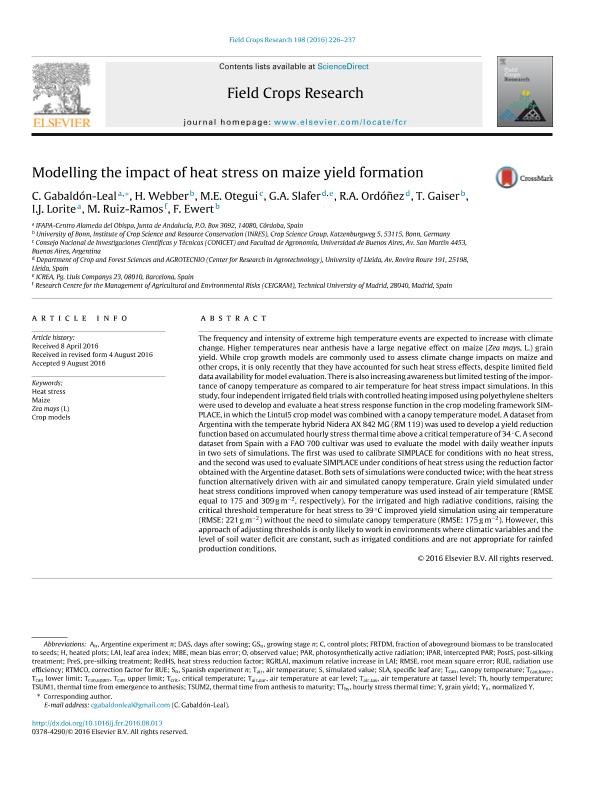Artículo
Modelling the impact of heat stress on maize yield formation
Gabaldón Leal, C.; Webber, H.; Otegui, Maria Elena ; Slafer, Gustavo Ariel
; Slafer, Gustavo Ariel ; Ordóñez, R. A.; Gaiser, T.; Lorite, I. J.; Ruiz Ramos, M.; Ewert, F.
; Ordóñez, R. A.; Gaiser, T.; Lorite, I. J.; Ruiz Ramos, M.; Ewert, F.
 ; Slafer, Gustavo Ariel
; Slafer, Gustavo Ariel ; Ordóñez, R. A.; Gaiser, T.; Lorite, I. J.; Ruiz Ramos, M.; Ewert, F.
; Ordóñez, R. A.; Gaiser, T.; Lorite, I. J.; Ruiz Ramos, M.; Ewert, F.
Fecha de publicación:
11/2016
Editorial:
Elsevier Science
Revista:
Field Crops Research
ISSN:
0378-4290
Idioma:
Inglés
Tipo de recurso:
Artículo publicado
Clasificación temática:
Resumen
The frequency and intensity of extreme high temperature events are expected to increase with climate change. Higher temperatures near anthesis have a large negative effect on maize (Zea mays, L.) grain yield. While crop growth models are commonly used to assess climate change impacts on maize and other crops, it is only recently that they have accounted for such heat stress effects, despite limited field data availability for model evaluation. There is also increasing awareness but limited testing of the importance of canopy temperature as compared to air temperature for heat stress impact simulations. In this study, four independent irrigated field trials with controlled heating imposed using polyethylene shelters were used to develop and evaluate a heat stress response function in the crop modeling framework SIMPLACE, in which the Lintul5 crop model was combined with a canopy temperature model. A dataset from Argentina with the temperate hybrid Nidera AX 842 MG (RM 119) was used to develop a yield reduction function based on accumulated hourly stress thermal time above a critical temperature of 34 °C. A second dataset from Spain with a FAO 700 cultivar was used to evaluate the model with daily weather inputs in two sets of simulations. The first was used to calibrate SIMPLACE for conditions with no heat stress, and the second was used to evaluate SIMPLACE under conditions of heat stress using the reduction factor obtained with the Argentine dataset. Both sets of simulations were conducted twice; with the heat stress function alternatively driven with air and simulated canopy temperature. Grain yield simulated under heat stress conditions improved when canopy temperature was used instead of air temperature (RMSE equal to 175 and 309 g m−2, respectively). For the irrigated and high radiative conditions, raising the critical threshold temperature for heat stress to 39 °C improved yield simulation using air temperature (RMSE: 221 g m−2) without the need to simulate canopy temperature (RMSE: 175 g m−2). However, this approach of adjusting thresholds is only likely to work in environments where climatic variables and the level of soil water deficit are constant, such as irrigated conditions and are not appropriate for rainfed production conditions.
Palabras clave:
CROP MODELS
,
HEAT STRESS
,
MAIZE
,
ZEA MAYS (L)
Archivos asociados
Licencia
Identificadores
Colecciones
Articulos(SEDE CENTRAL)
Articulos de SEDE CENTRAL
Articulos de SEDE CENTRAL
Citación
Gabaldón Leal, C.; Webber, H.; Otegui, Maria Elena; Slafer, Gustavo Ariel; Ordóñez, R. A.; et al.; Modelling the impact of heat stress on maize yield formation; Elsevier Science; Field Crops Research; 198; 11-2016; 226-237
Compartir
Altmétricas



